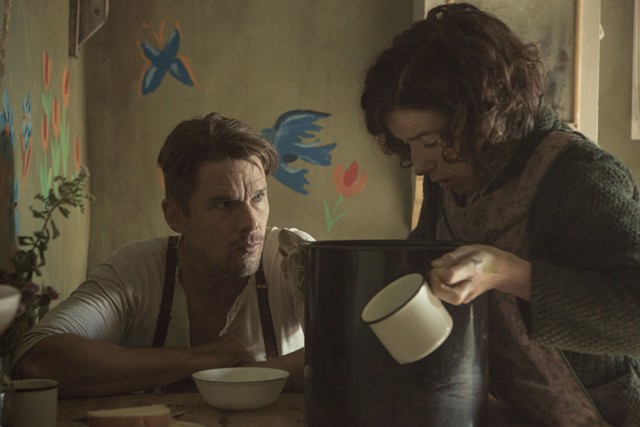Maudie Movie Review
 |
Maudie
Theatrical Release: June 16, 2017 (Canadian Release: April 14, 2017) / Running Time: 115 Minutes / Rating: PG-13 Director: Aisling Walsh / Writer: Sherry White Cast: Sally Hawkins (Maud Lewis), Ethan Hawke (Everett Lewis), Kari Matchett (Sherry), Gabrielle Rose (Aunt Ida), Zachary Bennett (Charles Dowley), Billy MacLellan (Frank), Marthe Bernard (Kay), David Feehan (Paul), Lawrence Barry (Mr. Davis - Shopkeeper) |
Maudie tells the true story of Canadian artist Maud Lewis. Set entirely in Nova Scotia, the film opens in the 1930s, when the meek and severely arthritic Maud (Sally Hawkins) lives with her disapproving Aunt Ida (Gabrielle Rose). A clunky and uncouth fish peddler, Everett is looking for a maid to live in his tiny home. As the only applicant, Maud gets the job, even if she isn't particularly qualified to tend to domestic affairs. Still, she tries hard and when she's not cleaning or cooking, she's painting. At first, it's birds on the walls. Then it's cards that Everett's fishing customers are prepared to pay for, beginning with a woman from New York (Kari Matchett).
Maud and Everett's bed sharing eventually turns into a marriage, one that viewed through the lens of 2017 seems pretty unfulfilling. Taking on more of the housework, Everett allows Maudie to paint more and more and meet the demand for her colorful renderings of flowers and sea. In time, the little house is attracting constant attention, a television crew interviews the artist and her perpetually cranky husband, and Vice President Richard Nixon even commissions a piece.
Written by Sherry White and directed by TV-seasoned Aisling Walsh, Maudie sheds light on an artist you've likely never heard of and dramatizes her strained but sincere union to the gruff Everett. Running just under two hours, the film is remarkably slow. That seems to be by design. Maudie's paintings take time and her marriage to Everett is not a short one. Eventually, the arrangement that strikes you as uncomfortable evolves into something tender and moving. But the journey there isn't the most pleasant or lively.
Naturally, Hawkins, who was Oscar nominated for Best Supporting Actress for Woody Allen's Blue Jasmine and Maudie does a fair job of transporting you to a time and place and letting you experience a couple's life. But it is very slow and also rather bleak. Even Maud's success at attracting a customer base feels like a minor triumph the movie doesn't truly celebrate. While there are worse ways to spend two hours in a movie theater this summer, this is a film you might well enjoy more on the small screen.
|
Related Reviews:
DVDizzy.com | DVD and Blu-ray Reviews | New and Upcoming DVD & Blu-ray Schedule | Upcoming Cover Art | Search This Site
DVDizzy.com Top Stories:
Sally Hawkins: Happy-Go-Lucky • Blue Jasmine • An Education • Godzilla (2014) • Paddington • Submarine • All Is Bright • Made in Dagenham
Ethan Hawke: Good Kill • White Fang • Before Midnight • The Phenom • Predestination • Regression • Boyhood
Zachary Bennett: Tales from Avonlea: Season 1
Mr. Turner • Big Eyes • The Light Between Oceans • The Sense of an Ending
Now in Theaters: Baby Driver • The Book of Henry • Wonder Woman • The Big Sick
Text copyright 2017 DVDizzy.com. Images copyright 2017 Sony Pictures Classics.
Unauthorized reproduction prohibited.
